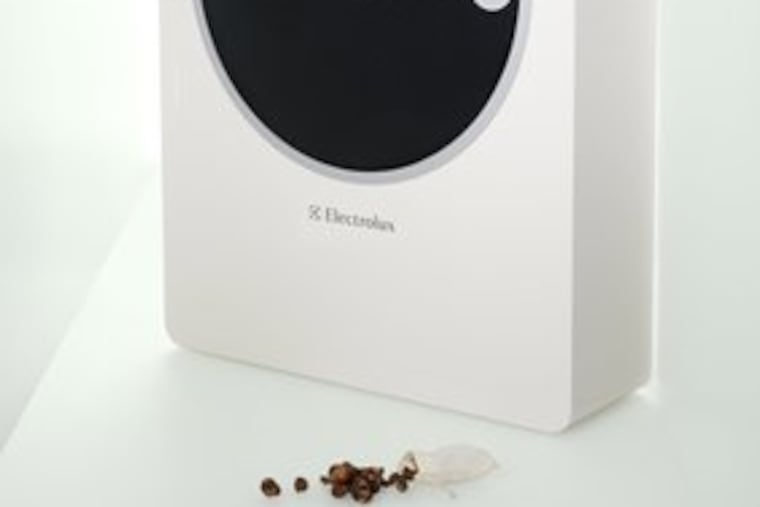Designed for coexisting
A competition yields products that can benefit both consumers and the environment.

Recycling and its importance are talked about a lot, but many experts believe the rate of recycling is actually dropping every year as total consumption increases.
Juan Ying-Hao, a design student from Taiwan who attends Cranbrook Academy of Art in Bloomfield Hills, Mich., believes this trend will continue even if renewable and biodegradable materials gain popularity. The reason: Centralized collection systems that have been developed for handling recycled materials will be overwhelmed by demand.
That outlook was behind Ying-Hao's entry in this year's Electrolux Design Lab competition: the Return Pot, which will turn plastic bags made from polylactic acid (PLA) resin into compost for plants.
The 2007 design lab, the fifth edition of the annual competition sponsored by the Swedish-based conglomerate, challenged students to devise "environmentally sound, commercially viable products and solutions that would enable consumers to live in greater harmony with the environment," according to Electrolux spokesman Tony Evans.
The prototypes were judged last month in Paris.
Inspiration for Ying-Hao's concept came from his thinking about what motivated people's daily habits.
"I realized that almost everything we do is driven by 'taking,' " he said. "I had a hard time thinking of a human action or ritual that is based on the genuine intention of 'returning,' except for reforestation, perhaps. So, with PLA resin technology, I thought this concept would fill the gap."
Ying-Hao believes PLA resin will gain popularity as it replaces petroleum-based plastics. Though PLA resin can be composted both naturally and industrially, a PLA plastic bag may take several years to decompose in landfill conditions.
"At the current rate of consumption, we will be challenged by excessive PLA waste if we only rely on natural decomposition," he said. "A PLA return machine as a home appliance is not only convenient for users, it will involve people personally in the process, thereby educating them.
"Since each return process will take up to a few days, the user will learn that results are not immediate and if he does not regulate the rate at which he consumes, he will have a PLA backup issue very quickly."
As the user spins the battery-less Return Pot, a ball bearing moves through a coil tunnel, creating a magnetic field that generates electricity to power the return cycle. The result is water, compost and a small amount of carbon dioxide, according to the inventor.
Ying-Hao was one of five finalists in the competition, which attracted students from colleges and universities worldwide.
The top prize went to Levente Szabó from Moholy-Nagy University of Art and Design in Hungary for E-Wash, a compact washing machine that uses soap nuts instead of detergent.
In India and Nepal, people have used the soap nut, or
Sapindus mukorossi
, for centuries to clean their clothing. A kilogram of soap nuts (2.205 pounds) would last the typical person a year, Szabo said, and soap nuts are good for people with allergies and gentle on clothes.
"The soap nut is a natural plant and can be cultivated. It does not harm nature, but is a part of it," said Szabo. "The other problem was the form of the conventional washing machine. I reduced the size and made it flat, so it would fit into a small apartment but also would be able to wash a lot of clothes at the same time."
Szabo received a prize of 5,000 euros and a six-month scholarship at one of the Electrolux Group's global design centers.
Second-place winner Laura Pandelle, a design student at École Boulle in Paris, created the Pebble solar food heater to demonstrate that photovoltaic energy doesn't just come from big panels on the roof but can be incorporated into the kitchen via spray-on solar cells, a cutting-edge technology now under development.
The cells are also sensitive to both visible and nonvisible radiation, which means they can produce energy even on a cloudy day. The technology allows any surface to be converted into a solar cell.
Go Fresh was the entry of third-place winner He Cheng Fei, of Jingjang University in China. It is a refrigerator made up of a main frame that produces cold air for 12 individual, temperature-controlled cells, much like the cells of a honeycomb. When a cell reaches the correct temperature, a cold-air inlet closes automatically, saving energy.
The type of food in each cell is identified by scanning in a picture of it, and the appropriate temperature is set automatically. The cells themselves are insulated and can be removed, making it possible to take them on a picnic.
The other finalists and their entries were:
Circompo, by Thanat Tengamnuay of King Mongkut's University of Technology in Thonburi, Thailand. Circompo is a composter and garbage bin that decomposes organic waste, especially food, using microorganisms that are kept under ideal conditions of air, moisture and heat to speed the process.
Fog Shower, by João Diego Schimansky of Pontificia Universidade Católica do Paraná, Brazil. Fog Shower uses microscopic water droplets and only 2 liters of water for a five-minute shower, compared with the 26 liters used by today's most efficient water-saving showerheads.
Pure Washer, by Tatjana Voronova of Hochschule für Gestaltung Schwäbisch Gmünd in Germany. Pure Washer is a rotating dual sink and detergent-free compact dishwasher that reduces water consumption.
Nature Wind, by Bae Won-Ho of Dong-A University, South Korea. Nature Wind is a solar-powered air cleaner mounted to a window that uses a series of filters to refresh and sanitize household air.